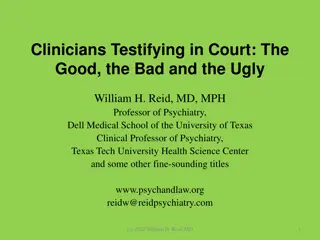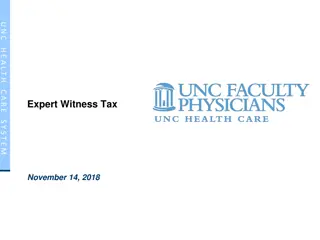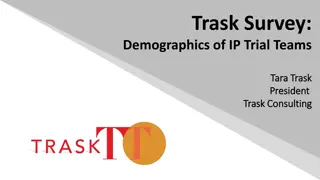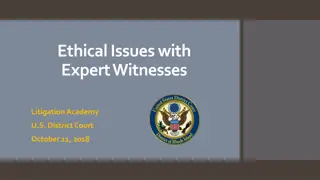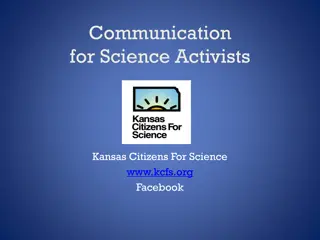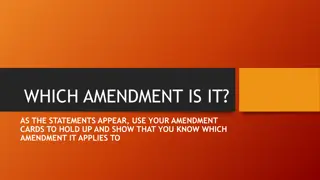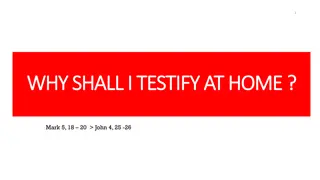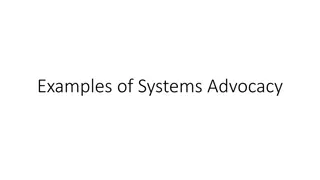Understanding Clinician Testimony in Legal Proceedings
This presentation by William H. Reid, MD, MPH provides insights for clinicians testifying in civil and criminal cases. It covers legal processes, ethical considerations, and principles of testimony. The content also distinguishes between expert and ordinary witness roles, and highlights the adversar
0 views • 41 slides
Taxation Process for Expert Witness Income at U.N.C.H.E.A.L.T.H.C.A.R.E.S.Y.S.T.E.M
Expert witness income at U.N.C.H.E.A.L.T.H.C.A.R.E.S.Y.S.T.E.M is subject to unrelated business income tax (UBIT) if the income is related to a provider testifying as an expert. The process involves calculating taxable income, determining tax rates, and reporting to the University's finance departme
0 views • 5 slides
Analysis of Gender and Race Demographics in Legal Teams
The survey conducted by Trask Consulting delves into the demographic composition of IP trial teams, focusing on gender and race distribution among lead counsel, partners, associates, testifying corporate representatives/clients, and technical experts. The findings showcase varying levels of represen
0 views • 13 slides
Understanding Ethical Issues with Expert Witnesses in Litigation
This article discusses ethical considerations related to expert witnesses in litigation, highlighting the differences in roles between lawyers and experts. It emphasizes the importance of truthfulness and independence for expert witnesses, along with their qualifications and the sources they may rel
0 views • 13 slides
Kansas Citizens For Science: Advocating for Science Education and Public Understanding
Kansas Citizens for Science (KCFS) is a nonprofit educational organization dedicated to promoting a better understanding and appreciation of science. Since its inception, KCFS has been actively involved in advocating for science education, educating the public about the nature and value of science,
0 views • 12 slides
Identifying U.S. Constitutional Amendments
Recognize various U.S. Constitutional amendments based on their corresponding statements using visual cues. The statements touch on rights like search and seizure, gun ownership, fair trials, excessive fines, state vs. federal authority, soldier quartering, rights beyond those listed, self-incrimina
0 views • 10 slides
The Five Witnesses to Jesus in John 5:31-47
Hostility towards Jesus arose as the Jews sought to kill Him for violating the Sabbath, claiming equality with God, duplicating God's works, giving life, executing judgment, and raising the dead. The witnesses to Jesus include Himself, John the Baptist, His works, the Father, and the Scriptures, all
0 views • 13 slides
Lessons Learned from Jesus' Interaction with the Demoniac
Jesus interacted with a demoniac, healed him, and urged him to testify at home. The lessons learned include allowing the Lord to direct our service, the importance of testifying at home, and the significance of transformed lives being evident in our communities.
0 views • 6 slides
Examples of Systems Advocacy in Action
Discover a series of impactful images showcasing different examples of systems advocacy, including bill signing events, community access initiatives, sit-ins, fun moments at SILC meetings, rallies, testifying on bills, and legislative receptions. These powerful visuals capture individuals with disab
0 views • 10 slides
